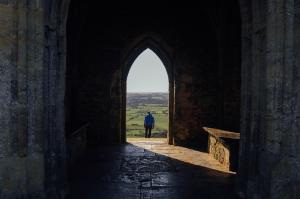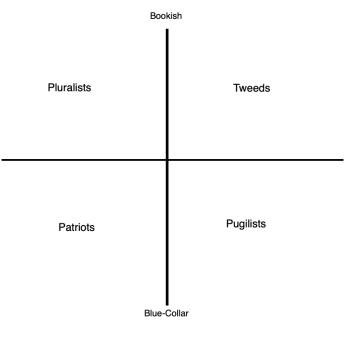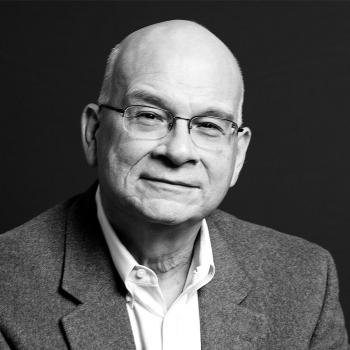
You’d be forgiven for thinking that many American churches these days are desperately trying to be something they’re not. A drive through my North Texas suburb takes one past massive churches bearing names like “Freedom,” “Sojourn,” “The Ridge,” “Bent Tree,” and—my personal favorite—“fellowshipchurch.com.” Stodgy designators like Methodist and Presbyterian and Lutheran are out; sleeker, more “seeker-friendly” names are in. (Some groups conceal their crypto-Baptist sensibilities better than others.)
On some level, though, these rebranding campaigns make sense. Broadly speaking, organized religion has fallen out of favor with my generation. “I’m spiritual, but not religious” has become ubiquitous to the point of banality. And skepticism—though less of God than of His institutional representatives—is undeniably the order of the day (often, sadly, for good reason). While some argue that millennials will be back to the pews as soon as they have kids—following an age-old pattern—it’s hard to avoid the realization that something is different this time. Any honest observer has to admit that many likely won’t be coming back.
Though I was brought up in conservative Lutheran parishes—not exactly known for their embrace of cultural fads—my upbringing was inflected (by osmosis) with 1990s-2000s evangelical sensibilities. And true to form, I was a typical “church kid”—reading in church, helping lead youth group classes, doing service projects, and so on. (At one point I even went to a youth retreat for potential future ministers.) I later headed off to a small Christian college near Washington, D.C., with a student body composed of people with histories much like mine. We were all full of enthusiasm and energy, and we were going to change the world. At least, we thought so.
Over and over again, the same pattern would play out. A couple years in, something would happen—usually a bitter disappointment of some sort—and students would find themselves calling their foundations into question. I’m sure this is the case at any college, but I have to think the effects were particularly pronounced at mine. Once that disillusionment set in, it was very difficult to shake. To this day, many alumni from my school continue to post extended screeds on social media about the poison of evangelical culture, the horrors of homeschooling, and the evils of the patriarchy. (It’s worth noting that despite all their claims of liberation from their oppressive upbringing, most still strike me as profoundly unhappy. We called them the “bitter alumni” for a reason.)
In recent years, there’s emerged a cottage industry of “exvangelical” books and podcasts catering to this specific demographic—those raised Christian, but now seeking forms of spirituality or authenticity outside the constraints of church. Besides the big names like Rachel Held Evans and Rob Bell, one thinks of Peter Enns and Jared Byas’ The Bible for Normal People, Kevin Porter and Caroline Ely’s Good Christian Fun, Mike McHargue and Michael Gungor’s The Liturgists, and many others. Most echo a common refrain: You just do you, folks. It’s cool if religion works for you, but it’s also cool if it doesn’t.
This message is both temporarily reassuring and ultimately dissatisfying. Perhaps it’s a message some folks long to hear—especially those emerging from distinctly toxic environments—but it provides small comfort in the long run. You do you necessarily transforms matters of core conviction into optional window dressing, forcing any seeker of truth—real, foundational, objective truth—to leave disappointed. (Although, as it turns out, most “exvangelicals” do have their own absolute, core convictions after all.)
I find these “exvangelical” perspectives interesting for a different reason: namely, the common thread in their accounts of why they left the church behind. Many talk about hypocrisy among church leadership, sexual abuse scandals, disagreement with traditional attitudes towards homosexuality, and so forth. But one criticism stands out as nearly universal: I never felt like I could ask questions. I never felt like I was allowed to wonder “why.”
This is a shame, because perhaps paradoxically, the engagement with such questions is one of the church’s profoundest strengths. In fact, it’s what kept me in—and more specifically, what kept me Lutheran.
At the same time one contingent of my college peers was abandoning their upbringing, another cohort was evolving in a different direction. They were realizing that the liturgy of centuries past was rather more substantive than the latest praise-and-worship jam. They were appreciating the gift of a vast historical tradition that had long ago reckoned with every question my generation could throw at it. (There really is nothing new under the sun.) Most importantly, they were beginning to explore the shadowy and largely misunderstood (for American Protestants) expanse of centuries between the era of the apostles and the beginning of the Reformation. Some went on to swim the Tiber to become Catholic, others swam the Bosporus to become Orthodox, and still others became Anglican or Lutheran or magisterial Presbyterian.
Sometimes it takes being a bystander to others’ journeys to realize what’s most important in your own. That’s precisely how I began to see the church universal—my church—through different eyes.
I awakened to the understanding, first and foremost, that Christianity had always been much more than hellfire insurance. The church had grappled with the most important issues in existence—questions of duty and free will and politics and sex and art and so on—for millennia. In fact, most of the history of the West was a story of engagement with the truth-claims of the Christian tradition. Those truth-claims form the groundwork for contemporary cultural debates over equality, liberty, identity, and countless others. Far from being a question-free zone, the church had always been the epicenter of engagement with those questions.
A necessary consequence of this insight was the recognition, with St. Augustine, that “all truth is God’s truth.” That is to say, it makes little sense to carve out “sacred” and “secular” categories of reasoning. Rather, everyday reality is saturated with matters of eternal concern, whether or not we’re aware of it. I’m a touch leery of using the term “worldview” here—but that’s really what we’re talking about. To put it simply: everything we encounter is ultimately “theological,” whether we admit it or not. All aspects of our experience implicate questions of ultimate concern, as Paul Tillich might say. The real question is whether we’re willing to acknowledge that.
Perhaps the churches of today’s seeking millennials and “exvangelicals” went astray when they sought to disavow the uniqueness of their role—the wonderful joy and privilege of engaging those foundational concerns. And I’m certainly not the first to suggest this, but the megachurches maybe lost a generation when they sought to rebrand as something more akin to a spa or corporate retreat than a place of reverence, a site of encounter with the ultimate source and end of all reality. Such a rebranding, after all, concedes far too much to the desaturated cultural landscape of late modern life.
Perhaps in the end, all those pesky questions were never really threats, but signs of a heartfelt longing to know God more deeply.












